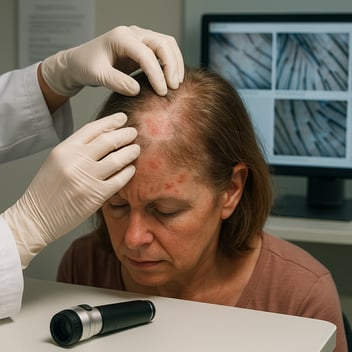Immunotherapy (DPCP, SADBE) Does NOT Help Scarring Alopecia
Diphencyprone (DPCP) and Squaric Acid Dibutyl Ester (SADBE) are long standing treatments for the autoimmune hair loss condition alopecia areata. The cause itching and burning in the scalp and essentially trigger an allergic contact dermatitis. The inflammation that these chemicals create can trigger hair growth in some patients with alopecia areata. It’s quite remarkable.

FIGURE 1. Diphenycyprone (DPCP) is a liquid that is applied to the scalp to treat alopecia areata. It causes an allergic reaction but can stimulate hair growth in some users.

FIGURE 2: Hair Regrowth in a patient with ‘ophiasis” type of alopecia areata who was treated with diphenyprone.
Does DPCP and Squaric Acid Help Lichen Planopilaris or Frontal Fibrosing Alopecia (FFA)?
DPCP and Squaric acid are not effective in these scarring alopecias. It’s not that large studies have been done – it’s just that I’ve seen patients many patients over the years with scarring alopecias who have come to see my after having DPCP. These patients were all mistakenly diagnosed as having alopecia areata when really they had frontal fibrosing alopecia or lichen planopilaris. Hair regrowth did not occur and many experiencing a significant worsening.

FIGURE 3: Patient with frontal fibrosing alopecia who was first thought to have the ophiasis form of alopecia areata and was treated with DCPC for many months. The patient did not experience regrowth.
There is absolutely no reason to believe that DPCP or squaric acid are effective in LPP or FFA. The pathogenesis of these two conditions is very different than alopecia areata. While it’s true that some treatments overlap – many do not. The following table summarizes some of these important differences. DPCP is effective for some patients with alopecia areata but is not effective in LPP. Doxycycline is effective for some patients withLPP but not helpful in treating alopecia areata.
Table 1: Treatments in Alopecia Areata vs Lichen Planopilaris

Article orginally posted at donovanmedical.com
For more information about cicatricial alopecia, visit carfintl.org



